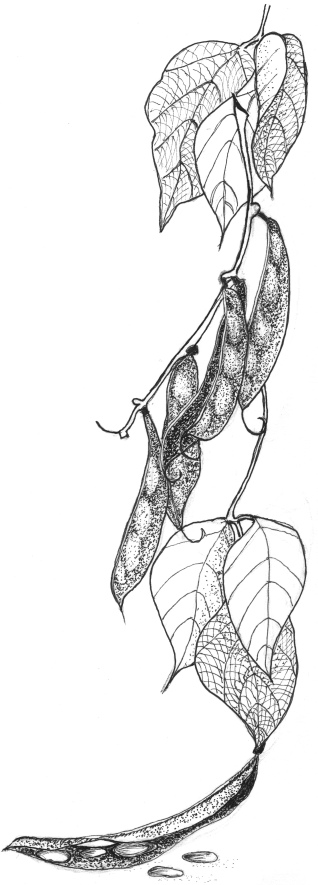| Table of contents | Previous VegeTale | Next VegeTale |
 |
Avarakkai is referred to as broad bean but it does not resemble the English or Australian broad bean. It is very common all over India but it has different names in parts other than southern India. A vine, it grows quickly, is easy to care for and fruits profusely for two to three years. It is rich in protein and iron and also has traces of magnesium, potassium, calcium and phosphorous. It is also very rich in dietary fibre.
In the late 70s a close friend was at a nursery in Perth when a local brought in a purple flower to ascertain what it was, fearing the flower and the bean might be poisonous to his children. My friend was amazed, for avarakkai was not known to grow in Perth and in those days quarantine regulations were very strict. So he offered to dig the plant out from the person's garden and take it home. These days it grows in most Indian homes but it is still to be sold commercially. At our house in Dianella, we have let it climb over our mango tree and it is fun plucking beans off a mango tree.
Recently my Italian neighbour, Pat, described a plant in his garden that seemed to have come from nowhere. He was describing the avarakkai and asked if I knew anything about it. As it turned out, either a dried pod had dropped off one of the branches of my drumstick tree on which this vine had also spread and landed in his garden or a bird might have dropped it there. But it has grown into a sturdy vine and has nearly choked his papaya tree. His friends love the taste and have asked him for seeds. So there you go for cultural assimilation by stealth!
Ramdas Sankaran
Perth
Avarakkai thoran
2 cups thinly chopped avarakkai
Heat the oil in a non-stick wok and add the mustard seeds. After they have spluttered, add shallots and sauté till golden brown. Then add garlic, ginger, cumin seeds, turmeric, chilli powder, urad dal and green chillies and sauté for a minute or two. Finally add the grated coconut, the avarakkai, curry leaves, and salt to taste. Stir lightly and cook on low flame for 12-15 minutes, with the wok covered.
Serve with rice and other curries.
2 tsp vegetable oil
2 tsp mustard seeds
6-8 shallots
4 or 5 garlic cloves, crushed
2-5 slit green chillies, depending on hotness required
Small piece of crushed ginger
Pinch of turmeric
1/2 tsp of chilli powder
1/2 cup of grated coconut
1/2 tsp cumin seeds
1/2 tsp urad dal (split black lentils and readily available in Asian grocery shops)
1 to 2 sprigs of curry leaves
Salt as required